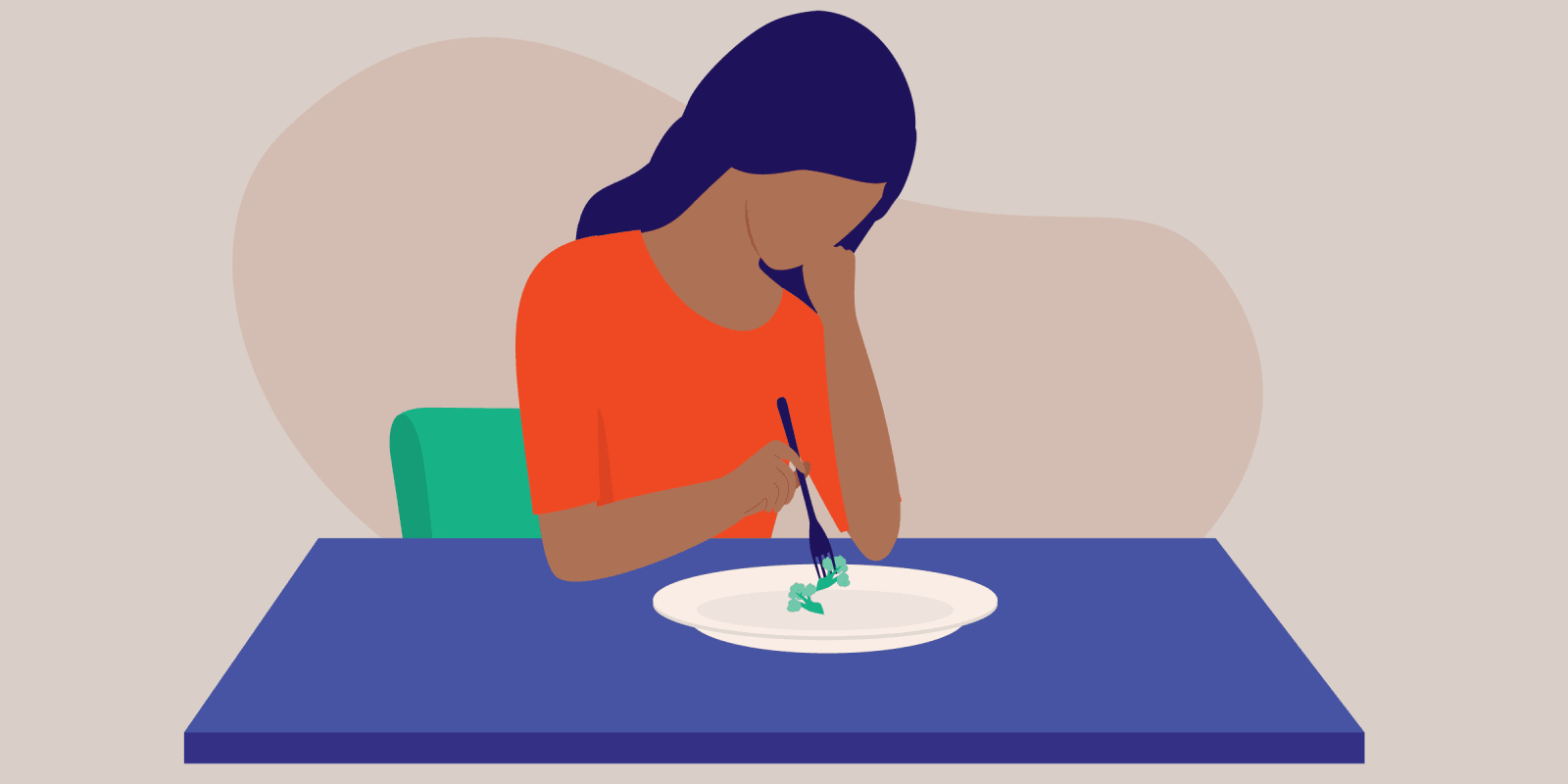Editor’s Note: The following article contains depictions of eating disorders.
I worked on an inpatient child psychiatry unit this past fall and had a patient, so pale she was almost translucent, who was admitted to a medical floor for severe weight loss due to anorexia nervosa. During her psychiatric intake interview, she told me she ate one cup of low-sodium broth daily, and that her father congratulated her for being so healthy. I had another patient admitted for eating disorder recovery whose mother made her weight loss smoothies for breakfast, portioned out snacks, and wouldn’t prepare carbs for dinner. Both of these patients had had disordered eating patterns for several years, but they blossomed into eating disorders that required hospitalization during the COVID-19 pandemic. Since the pandemic first led to stay-at-home orders, a survey showed that people with anorexia and bulimia experienced worsening of symptoms. Between March 2020 and June 2020, calls to the crisis help line for the National Eating Disorders Association increased by 78%.
Eating disorders are the third most common chronic illness in adolescent females, have the highest mortality rate of any mental illness, and increase the risk of suicide. And for many different reasons, these conditions have been exacerbated by the COVID-19 pandemic. People have increased anxiety about health and finances. The rise of remote work/school has also had people closer to their kitchens for nearly the entire day; the constant access to food can heighten anxieties for people who already struggle with restricting or binging behaviors. In addition, social distancing has introduced a sense of isolation for many, which makes disordered eating easier to hide and worsens mental health. Finally, the rhetoric and attitude around weight and fitness during the pandemic can be extremely triggering, such as jokes about gaining “the quarantine 15” or the “COVID 19.”
Maybe I’m hypersensitive to the cultural capital of thinness and the lengths which kids will go to achieve it because I hit adolescence in the early 2000s. Remember when our moms told us, “When you’re hungry, just drink a big glass of water because you’re probably thirsty”? Remember when magazines told you that if you want to eat something “bad,” just chew it up for the taste and spit it out? While that kind of drastic messaging is less prevalent today, it’s been replaced by more insidious “wellness” and “clean eating” trends. It’s been replaced by Fitbits and MyFitnessPal tracking our every bite and move — despite a study of college students that showed that those who used calorie trackers had significantly higher eating disorder symptomatology. It’s been replaced by pushing dieting on children due to concern over “the obesity epidemic,” despite no evidence of improved health outcomes — and despite studies of children in school-based childhood obesity prevention programs that showed significant increase in behaviors associated with development of an eating disorder.
We need to be proactive about protecting kids against eating disorders and their mental and physical consequences, especially during the COVID-19 pandemic. I do not have the background to speak on the relationship between weight and health, other than to say it is much more complicated than even doctors truly understand. But assuming that weight gain is inherently bad is fatphobic, and passing that message along to adolescents and children who are already surrounded by messaging that emphasizes thinness at any cost is frankly dangerous. So what can we do to protect kids? We can keep an eye out for warning signs of eating disorders for early intervention, including increased preoccupation with food labels and specific grams of fat or carbs, inflexible calorie counting, skipping meals, frequent “body checking,” refusal to eat in front of others, and withdrawal from friends or activities.
But we also need to be cognizant of the way we talk about food and weight in front of kids. The rise of eating disorders is proof that this country’s preoccupation with one ideal model of health is actually causing illness. Kids’ mental health is already struggling during this pandemic, and putting moral judgments on weight and food is exacerbating existing issues with eating. When I was a tween, I remember girls at my middle school discussing advice from supermodel Kate Moss: “Nothing tastes as good as skinny feels.” It’s disappointing that we still haven’t been able to move past that view of “health,” and that kids are ending up in the hospital because of it.
How do you encourage healthy eating behaviors among your patients? Share strategies in the comments below.
Apshara Ravichandran is in her final year of medical school at Saint Louis University School of Medicine, and is applying to Psychiatry residency with plans to pursue a Child Psychiatry fellowship.
If you or someone close to you is struggling with an eating disorder, please call the National Eating Disorder Association at 800-931-2237 or text NEDA to 741741.
Image by simplehappyart / GettyImages







